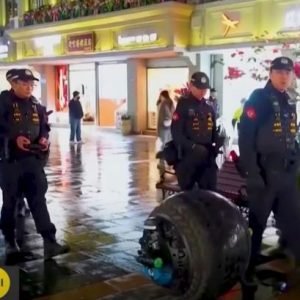
Coalition takes aim at Labor over ‘open-slather approach’ to international student caps
Sarah Basford Canales
The opposition has hit out at Labor’s “open-slather approach” on limiting the number of international students that can study in Australia, with shadow education minister, Sarah Henderson, vowing to impose a “much tougher” but unspecified cap.
As my colleague Caitlin Cassidy reported earlier today, the Albanese government introduced a new ministerial direction to throttle student visa applications once a tertiary education institution has reached 80% of its proposed international student cap.
Labor’s approach replaces a former ministerial direction that gave visa processing priority to “low risk” sandstone universities and students from “low risk” nations.
The Coalition has pledged a tough crackdown on the increasing number of international students entering the country after record lows in 2021 and 2022 due to the pandemic.

Figures from the education department, released Wednesday, show there were more than 200,000 higher education commencements across the country in 2024.
Labor has planned to pass legislation in the final sitting weeks to remove the former ministerial direction and replace it with new powers to set a cap on universities and suspend and cancel courses.
The Greens and the Coalition teamed up against the changes and the bill did not pass.
Henderson clarified on Thursday the opposition still supported a policy of limiting foreign student numbers, promising to bring in a “much tougher cap”.
She added:
By tying the new Ministerial Direction 111 to Labor’s flawed student caps scheme, the government will continue to drive excessive numbers of foreign students to Australia’s elite, metropolitan universities.
This open-slather approach places no limit on the number of foreign students who can come to Australia.
The Coalition will impose a much tougher cap on foreign students at metropolitan universities which puts the needs of Australians first.”
But how would the opposition do that differently? We’re still none the wiser.
Key events
Catie McLeod Hello, I hope you’ve had a great day so far. I’ll be with you on the blog until this evening.
Rafqa Touma Thanks for joining me on the blog today. Handing over now to Catie McLeod who will keep you posted on the afternoon’s news.
Sarah Basford Canales The opposition has hit out at Labor’s “open-slather approach” on limiting the number of international students that can study in Australia, with shadow education minister, Sarah Henderson, vowing to impose a “much tougher” but unspecified cap.
As my colleague Caitlin Cassidy reported earlier today, the Albanese government introduced a new ministerial direction to throttle student visa applications once a tertiary education institution has reached 80% of its proposed international student cap.
Labor’s approach replaces a former ministerial direction that gave visa processing priority to “low risk” sandstone universities and students from “low risk” nations.
The Coalition has pledged a tough crackdown on the increasing number of international students entering the country after record lows in 2021 and 2022 due to the pandemic.
Figures from the education department, released Wednesday, show there were more than 200,000 higher education commencements across the country in 2024.
Labor has planned to pass legislation in the final sitting weeks to remove the former ministerial direction and replace it with new powers to set a cap on universities and suspend and cancel courses.
The Greens and the Coalition teamed up against the changes and the bill did not pass.
Henderson clarified on Thursday the opposition still supported a policy of limiting foreign student numbers, promising to bring in a “much tougher cap”.
She added:
By tying the new Ministerial Direction 111 to Labor’s flawed student caps scheme, the government will continue to drive excessive numbers of foreign students to Australia’s elite, metropolitan universities.
This open-slather approach places no limit on the number of foreign students who can come to Australia.
The Coalition will impose a much tougher cap on foreign students at metropolitan universities which puts the needs of Australians first.”
But how would the opposition do that differently? We’re still none the wiser.
Fears Vanuatu health system could be overwhelmed after earthquake
Vanuatu’s public health system risks being overwhelmed amid mounting waterborne disease, aid agencies have said, as a lack of clean water and patchy telecommunications service complicated rescue operations after Tuesday’s powerful 7.3 magnitude earthquake.
The government’s disaster management office said early on Wednesday that 14 deaths had been confirmed, but hours later said nine had been verified by the main hospital. The number was expected to increase because people remained trapped in fallen buildings, a spokesperson said. About 200 people have been treated for injuries.
Much of Vanuatu remains without water after two large reservoirs serving the capital, Port Vila, were totally decimated by the earthquake, the National Disaster Management Office said. Landslides and aftershocks exacerbated the damage to water infrastructure and increased the risk of disease, aid agencies said.
Read more:
Peter Hannam Australians’ wealth rose almost 10% in the past year, ABS says
You might not feel particularly flush just now but Australians’ collective wealth has continued to swell, rising 9.9% in the year to 30 September, the ABS has reported today.
The $16.9tn estimated household wealth translates into about $625,000 per Australian, and the September quarter marked eight in a row that wealth has increased. Compared with June 2022, wealth has risen 17.4%, according to ABS data.
Of course, a lot of the increase in health has been linked to rising house prices, which might ease the pain of repaying the mortgage just a bit. (The December quarter will probably mark a ninth quarter in a row of bulging wealth unless we get a string of days like today on the stock market, where shares have shed about 2%.)
Superannuation assets rose 3.5% (or $137.4bn) in the September quarter, aided by the increase in the super guarantee from 11% to 11.5%, the ABS said.
The Reserve Bank will be wary that an increase in the value of our assets will be accompanied by a “wealth effect” of households spending a bit more. However, there’s little sign of that spending splurge.
The government’s mid-year economic and fiscal outlook (Myefo) out yesterday forecast the growth of household consumption in this fiscal year will be only 1%, or half what they were expecting in the May budget.
(The Kiwis copy us for many things, such as Reserve Bank of New Zealand. They also have a half-year economic and fiscal update. Myefo wears it better, I think.)
The RBA in its most recent statement on monetary policy also had pencilled in a 2% growth pace for consumption in 2024-25. If they rein in their consumption predictions ahead of their next board meeting, set for 17-18 February – they might be more inclined to cut their key interest rate at that gathering. (Trouble is, we probably won’t know about that revision until the rates verdict lands.)
Odds continue to shift gently towards a February RBA rate cut, but a lot can change between then and now.
Catie McLeod The New South Wales corruption watchdog will not investigate the premier, Chris Minns, over his involvement in the proposal to turn Rosehill racecourse into 25,000 homes.
In a statement released a short time ago, the Independent Commission Against Corruption (Icac) said it had determined the information received did “not indicate a reasonable likelihood of involving corrupt conduct”.
That decision was made unanimously by an assessment panel of three commissioners and senior staff, the watchdog said.
The referral was made by a NSW parliamentary inquiry into the Rosehill plan, which found the Minns government failed to maintain impartiality in its championing of the controversial deal.
In its report, released on 6 December, the upper house inquiry found the government had not followed proper process in the early stages of its dealings with the Australian Turf Club.
It also found that Minns labelled a meeting with the head of the Australian Turf Club, Steve McMahon, as a “meet and greet” in one of his diary disclosures.
The inquiry found this was “misleading” and inappropriate given Minns and McMahon’s longstanding friendship, and that the premier should have declared a conflict of interest.
The inquiry referred its report to Icac. At the time, Minns emphatically denied any suggestion of wrongdoing.
Icac has now confirmed that it will not pursue the report’s referral or an earlier referral that canvassed “analogous allegations”.
The watchdog’s chair has written to the parliamentary committee which chaired the inquiry to advise it of the decision not to investigate the matter.
You can read more of our coverage here:
Tory Shepherd Racism ‘deeply entrenched’ at universities, human rights commission finds in Respect at Uni report
“Both interpersonal and structural racism are pervasive and deeply entrenched at universities”, the Australian Human Rights Commission has found.
The commission has published an interim report on its study, Respect At Uni.
Race discrimination commissioner Giridharan Sivaraman said the “alarming increase in antisemitism” on university campuses was one of the catalysts of the project.
He said:
Racism impacts different communities in different ways, including Jewish, Muslim, Palestinian and Arab students and staff.
It has a profoundly negative impact on First Nations students and staff.
International students also felt excluded and unwelcome, and African and Asian students and staff described “frequent and severe incidents of racism”.
A “significant amount of work” is needed to address the issue, Sivaraman said, and the commission will make recommendations in their final report next year.
Caitlin Cassidy Group of Eight universities opposed to Labor’s new international student policy
University bodies have come out broadly supportive of Labor’s new international student policy, but not the Group of Eight (Go8).
Ministerial Direction 111, introduced from today, replaces the current policy of visa processing priority for “low risk” sandstone universities with giving all education providers high priority processing until they reach 80% of their proposed international student cap.
The caps failed to be legislated last month when they were were defeated by the Liberals and the Greens.
Ceo of the Go8, which represents Australia’s research intensive universities,Vicki Thomson, said replacing “one flawed process with another” wouldn’t improve integrity and quality of the international student visa system.
She said:
We run the risk of confusing the international student market with these constant changes to policy settings.
For too many potential students, it makes Australia look too hard and too unwelcoming as a higher education destination.
Having set targets for each Australian university’s international enrolments for 2025, it makes no sense that prompt government support processing visas will only apply to 80% of that target.
Even more bewildering is the fact that the direction allows for processing to be slowed down once this threshold reaches 80% – not the full threshold.
You can see the full cap breakdown here:
Elias Visontay NSW government vows to prevent Christmas and New Year’s travel chaos
The New South Wales government has vowed to “take every possible measure” to ensure Sydney’s train network runs smoothly over Christmas and New Year’s Eve after the federal court cleared the way for rail unions to resume industrial action immediately.
After Thursday’s federal court ruling and a vow from union chiefs to resume action – including possible work stoppages – immediately, a NSW government spokesperson said:
We will continue to take every possible measure to ensure industrial action does not affect Christmas and New Year’s Eve.
Our next step is to lodge a section 424 into the Fair Work Commission to protect New Year’s Eve and stop rail disruption.”
Jo Haylen, the NSW transport minister, is expected to speak shortly.
Caitlin Cassidy Greens accuse Labor of ‘dog whistle’ on migrants under new international student policy
The Greens’ reaction to Labor’s new international student policy is lukewarm at best, with the deputy leader and spokesperson for higher education, Senator Mehreen Faruqi, accusing the government of continuing to “dog whistle” on migrants.
Faruqi said the replacement of Ministerial Direction 107 with Ministerial Direction 111 was welcome but the “heart of the issue remains unchanged”.
Instead of targeting regional universities and “high risk” countries, the new policy will slow visa processing after institutions reach 80% of their proposed international student cap.
Faruqi said Labor was using the “same flawed international student caps that were thoroughly rejected by … the sector” with their new direction.
This might be a small reprieve for a sector that has been crushed for too long, but implementing international student caps by stealth through a ministerial direction is sneaky and does not tackle the issues universities face.
Labor continues to dog-whistle and blame international students and migrants for the housing crisis they did not cause. The Albanese government should be ashamed of competing with Dutton’s Coalition in the terrible race to see who wins on punching down on migrants the hardest.
Elias Visontay Sydneysiders have been warned to expect imminent disruptions across the city’s rail network – including in the lead-up to the busy New Year’s period – after a court quashed the state government’s bid to halt industrial action paving the way for unions to resume work stoppages.
On Thursday, the federal court dismissed the Minns government’s attempt to ban industrial action that rail unions had voted to take, undoing an interim injunction the government secured two Sundays ago which effectively paused rolling industrial action – which had been launched after an intense negotiating period for a new pay deal broke down.
After the federal court’s decision, Toby Warnes, the New South Wales secretary of the Rail Tram and Bus Union (RTBU), said the union would now tell its members they could bring forward industrial action. Before Thursday’s ruling, the union had applied for a fresh protected industrial action ballot – which members voted in favour of – that would be exempt from the interim injunction.
“As a result, industrial action will recommence immediately. We’re going back to our office to inform our members to enforce the bans that were on immediately before the injunction two Sundays ago,” Warnes said.
Work stoppages, as well as distance limits for drivers and orders to deactivate Opal readers, are among the industrial actions that can now take place.
Continued from previous post:
Weather conditions are forecast to ease in the south-east on Thursday, as a south-easterly surge from New South Wales pushes north.
“That means showers will start clearing from the south-eastern areas while continuing in parts further to the north,” the Bureau of Meteorology’s Miriam Bradbury said.
As residents in the south-east wait for flood waters to subside, Queensland’s north is preparing for the next deluge of wet weather.
The bureau has warned a trough offshore the coast of Townsville will drift northward from Thursday and linger for days.
A weak embedded low may form in the trough later in the week but the bureau believes it is unlikely to become a tropical cyclone.
Daily rainfall totals up to 60mm are forecast on Thursday and up to 80mm on Friday but there could be heavier localised falls of up to 200mm.
“There is significant uncertainty in the timing and location of the heaviest rainfall, though small coastal catchments may receive the highest rainfall totals,” the bureau said.
“Localised river level rises and flash flooding are likely within the areas of heaviest rainfall, with isolated minor riverine flooding possible.”
– Australian Associated Press
Emergency alerts as deluge raises rivers
Anxious residents in two regional areas are waiting for flood waters to subside after emergency alerts were issued for rising river levels after days of heavy rain.
People in the Western Downs and South Burnett in Queensland have been told to be prepared to evacuate homes ahead of possible inundation.
“Residents in low-lying areas should PREPARE NOW,” Queensland police said in an alert early on Thursday.
Warn neighbours, secure belongings and enact your emergency plan.
It follows days of heavy rain across south-east Queensland which caused flooding and power outages.
Conditions are forecast to ease but the state’s north could next be in the firing line of torrential downpours with a possible storm system forming off the coast.
The Western Downs mayor, Andrew Smith, said the council was monitoring the situation in Jandowae after the local dam started spilling overnight.
“We still have water coming into the dam. It is very much a watch and see,” he told ABC Radio.
We’ll wait and see what unfolds during the day but I think the forecasts are very favourable.
A major flood warning has also been issued for downstream of the Logan River at Beaudesert, expected to reach 8.3 metres on Thursday.
– Australian Associated Press
Caitlin Cassidy The National Tertiary Education Union (Nteu) has urged the federal government to ensure no jobs will be lost as a result of its new policy on international student visa applications.
Ministerial Direction 111, which comes into effect today, will slow down visa processing once an institution reaches 80% of its proposed international student allocation in place of smaller universities and “high risk” countries, as was in practice.
Nteu national president, Dr Alison Barnes, said the federal government must guarantee there would be no job losses stemming from a reduction in international students.
We are calling for a transition fund to be put in place to ensure universities have no excuse but to protect their most precious asset – staff.
Vice-chancellors have already shown a willingness to use changes to international student arrangements as fig leaf to cover their own failures, and unfairly threaten job cuts.The scaremongering must now end once and for all.
We need an iron-clad commitment from universities and the federal government that this ministerial direction will not lead to a single job being cut.


Coalition takes aim at Labor over ‘open-slather approach’ to international student caps


Icac won’t investigate Chris Minns over Rosehill racecourse proposal





Rail union to bring forward industrial action








